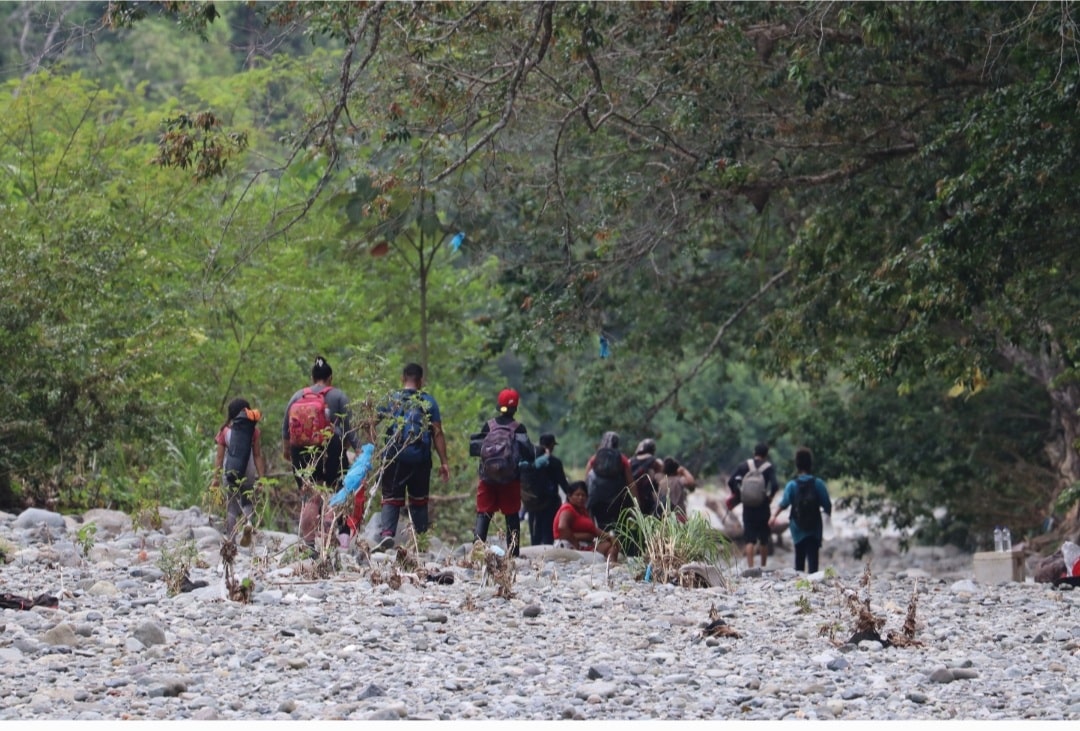
Human Rights Watch has highlighted the shortcomings of Colombian and Panamanian authorities in safeguarding and aiding migrants traversing the Darien Gap, according to its latest report. Released on April 3, 2024, the report, titled “Neglected in the Jungle,” underscores the perilous conditions of the migrant journey and the numerous threats faced, including inclement weather, hunger, and diseases, as well as sexual violence, kidnappings, and various forms of mistreatment. The report calls for increased support from the Colombian and Panamanian governments for the migrants and provides several recommendations, such as boosting the presence of specialized institutions and enhancing coordination with humanitarian organizations to more effectively oversee migrant flows in the Darien Gap.
The Darien Gap migrant crisis intensifies
The Darien Gap has served as a migration transit point since the 1990s, but it was not until the mid-2010s that this mountainous watershed jungle became a major migration route to the United States. Initially, the flow of migrants, primarily Haitians, remained moderate. However, the exacerbation of the Venezuelan economic and political crisis, the tightening of U.S. and Central American immigration policies towards legal Venezuelan immigration, and possibly the perception of a Democratic administration in the U.S. being more tolerant towards illegal immigration compared to Republicans, triggered an unprecedented migratory surge through the Darien Gap from 2021.
Indeed, the Panamanian migratory authorities officially registered 133,653 individuals crossing in 2021, but this number soared to 520,085 people in 2023; and this record figure is expected to be surpassed in 2024. In comparison, while 49,291 migrants were registered between January and February 2023, the figures for the same period in 2024 indicate 73,167 people, marking a 33 percent increase. Projecting this rate across the entire year, the number of migrants traversing the Darien Gap in 2024 could surpass 700,000.
Venezuelans, Ecuadorians, Haitians, Chinese, and Colombians comprised the main nationalities at the crossing points, making up about 91 percent of all migrants passing through the Darien Gap, with Venezuelans alone constituting approximately 63 percent of the population.
A dangerous journey
Crossing the Darien Gap, with its alternating rivers and dense mountainous jungle, is extremely challenging and has resulted in the loss of thousands of migrants’ lives. Human Rights Watch’s report specifically highlights the pressing needs of migrants on both the Colombian and Panamanian sides of the Darien Gap, with access to food, water, healthcare, and housing being the primary concerns regarding their living conditions. Indeed, migrants often lack necessities during their journey, a problem that becomes particularly acute when they are stranded at transit points. Such an incident occurred recently when Colombian authorities halted boat transportation in the Uraba Gulf, leaving thousands of migrants stranded in the cities of Necocli, Turbo, and Apartado. This situation is especially critical considering that 22 percent of the migrants are children, complicating the journey and management of the humanitarian crisis further.
Beyond material hardships, migrants are particularly vulnerable to criminal activities, with instances of sexual violence being common and largely unreported or uninvestigated. Specifically, on the Colombian side of the Darien Gap, the absence of state control in the region, a stronghold of the paramilitary drug cartel Gulf Clan, presents another challenge. This criminal organization is directly involved in migrant trafficking, with numerous investigations indicating its dominance over the main transportation and transit facilities in the area. In some cases, Human Rights Watch has even reported the coercion of migrants into smuggling drugs.
Human Rights Watch recommendations
Among its key findings, the NGO’s report emphasized the need for Colombian and Panamanian authorities to strengthen state control in transit areas to prevent criminal organizations from exploiting migrants. Specifically, it highlighted the necessity to investigate crimes against migrants, particularly sexual violence, and to reinforce the 1984 Cartagena Declaration on refugees’ rights. Human Rights Watch also stressed the importance of collaboration with humanitarian organizations, notably mentioning that Panama had suspended the activities of Médecins Sans Frontières (MSF) in the country. Indeed, Panama has adopted a pragmatic stance towards migrants, notably launching a campaign titled ‘Darien is not a road, it is a jungle’ in August 2023, an unsuccessful move aimed at discouraging migrants from crossing the Darien Gap.
See all the latest news from Colombia and the world at ColombiaOne.com. Contact our newsroom to report an update or send your story, photos and videos. Follow Colombia One on Google News, Facebook, Instagram, and subscribe here to our newsletter.

